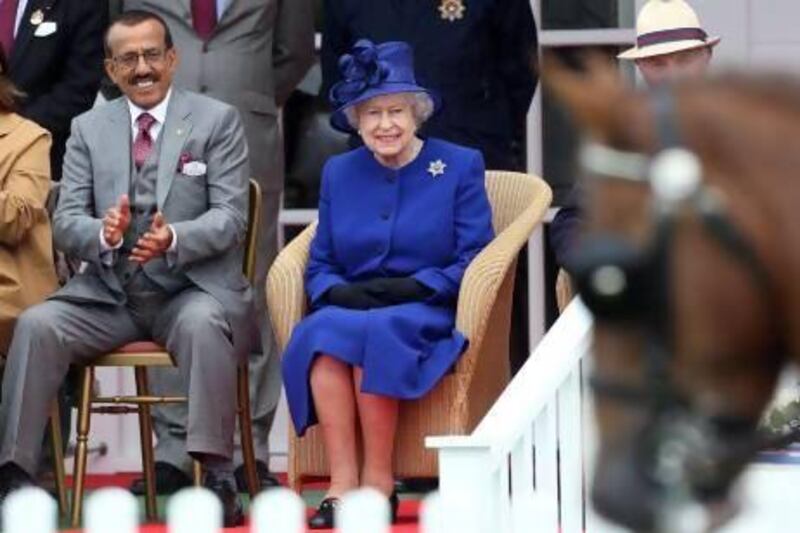On a blustery Sunday afternoon last month, an Emirati businessman and philanthropist, Khalaf Al Habtoor, stood beside Britain's Queen Elizabeth in Windsor Great Park as she handed out trophies to the winners of Al Habtoor Royal Windsor Cup, a polo tournament that had just reached its climax.
The day was a double celebration for Mr Al Habtoor, who grew up in relative poverty in then-rural Dubai and became one of the UAE's most successful entrepreneurs.
That morning, he had unveiled the UK edition of his autobiography to a gaggle of reporters in the clubhouse of the Guards Polo Club, while celebratory drinks were passed around in fluted glasses.
"I write because I love my country," he says, with this love moving him to speak up about "anything that will affect it".
East-West relations figure prominently in his book, including the US-led invasions of Iraq and Afghanistan.
"Why are the British and the Americans losing their men and women? For nothing. This is what I want to say, even if sometimes people don't listen," he says. "But if I throw these darts I might hit something, you know?"
Appended to the autobiography are letters written to world leaders including the US president, Barack Obama, and the British prime minister, David Cameron, with detailed policy suggestions.
Dressed on the day not in the kandura and gutra he sports on the book jacket but in a grey pin-stripe suit with a red paisley tie and pocket square, Mr Al Habtoor is an animated presence, quick to smile and joke.
"I like people who are positive," he says, quipping that he never reads romance novels or anything engineered to make readers cry.
He is eager to talk seriously about Syria, Palestine, Iran and Islamophobia, subjects many business moguls would rather avoid.
In the preface to his book he explains his candour: "We Arabs love to complain that we are misunderstood by Americans and Europeans, but unless we are prepared to open up, we will never be able to shake off false negative stereotypes. We're not used to baring our souls in public. We don't reveal all on talk shows. We're private people. But we do need to communicate to the rest of the world who we are and what we stand for."
Mr Al Habtoor has worked hard to ensure he has the ear of influential people. In a foreword to the book, a former US president, Jimmy Carter, praises his willingness to express "his strong views in a forward-looking manner" and writes that "to read of his life is to take inspiration from his actions".
As well as donating heavily to the Carter Centre, an organisation set up by Mr Carter to fight disease and promote peace, and sponsoring the Royal Windsor Cup, Mr Al Habtoor has organised an annual women's tennis tournament in Dubai, funded a sports field at the American University in Cairo, and bequeathed more than Dh3.67 million for a leadership centre at Illinois College in Jacksonville.
His Al Habtoor Group, with a portfolio spanning the hospitality, construction and automotive sectors, has been valued at Dh22 billion.
What got him to this place, the autobiography suggests, is guts and persistent, optimistic energy.
Although related, through the marriage of a cousin, to a member of Dubai's Ruling family, who helped support the family, Mr Al Habtoor grew up drinking murky water crawling with insects in a one-room house on the edge of the desert.
When he was born, in about 1949 although the exact date was never recorded, Dubai was a fishing and trading town that was home to fewer than 20,000 people. Mr Al Habtoor's father was a pearl trader and the family grew up across the creek from the town.
A reluctant student, he spent the few years that he was in school playing truant and swimming in the sea with friends.
By the age of 10, he had stowed away on a cargo ship to India with his father and older brother on a trading trip.
He had also written to Egypt's then much-loved president, Abdel Nasser, expressing his admiration. By 16, a marriage had been arranged for him and he became head of his own household. Roasted lamb and a truckload of Pepsi and 7 Up were served at the wedding.
Mr Al Habtoor's business strategies seem to have been built on trial and error - there were many dead ends before things started to take off.
Importing Scandinavian tents and fridges did not work out, nor did making soap, selling jewellery or producing films.
But he had some experience - and made some contacts - working as a teenager for a construction company run by a friend of his father's.
Trying his hand at entrepreneurialism one more time, he managed to talk his way into an office space that did not have to be paid for right away and set up an engineering firm with a Palestinian friend.
They started with a small house that barely turned a profit, then built a road, an apartment building, a cinema, a hospital, a hotel, and later the Habtoor Grand Resort and Spa and some of the UAE's most iconic landmarks. Car distribution, education, publishing and philanthropy all followed.
Intertwined with the story of Mr Al Habtoor's rise is Dubai's own rags-to-riches narrative. Born before the UAE was formed, he remembers Dubai airport when it was little more than a barn in the middle of the desert.
He was affected by the example of Sheikh Zayed, the first President and Father of the Nation, notably his tolerance, willingness to listen to others' opinions and the way he poured funds into roads, schools, hospitals and affordable housing.
He recalls the way the country felt vulnerable to attack after the British withdrew, the money that was around after oil prices stayed high following the 1973 oil crisis, the fear after Saddam Hussein invaded Kuwait in 1990 that the UAE might be next, and the repercussions of the recent financial crisis.
The book serves as a crash course not only in Emirati history, but also in the history of relations between Arab countries and the West, and Mr Al Habtoor is not afraid to say exactly how he feels when it comes to America's relationship with Israel, or the Iraq War, or the way that Hollywood portrays Arabs.
Despite these criticisms, he says: "I admire the US probably more than any other country for its contribution to the world in terms of science, technology, human rights, personal freedoms and civil liberties."
He likes Bill Clinton and, more controversially in the light of his recent court conviction, the former Italian prime minister, Silvio Berlusconi. He is disappointed by Mr Obama and blames George W Bush for creating "a chasm between Americans and Arabs".
He is also a fan of Britain, where he has a house in the Berkshire countryside, and of the queen, who he describes as "the personification of female dignity and honour". He is also a fan, of course, of polo - a sport that may have originated in the Middle East but which has come to seem as English as Earl Grey tea.
After his talk and before a three-course lunch in the clubhouse, six members of Mr Al Habtoor's family, sons and grandsons, played in a special challenge match, looking athletic in snowy jodhpurs.
"It's a strong sport, it's great," Mr Al Habtoor says, although he himself prefers tennis, playing, it is said, for two hours a day.
The Band of the Welsh Guards, dressed in their familiar red uniforms and bearskin hats, paraded on the field and played the national anthem, then the Cup final kicked off - a close match won by the Argentine star Joaquín Pittaluga's team, Ferne Park.
A ripple spread through the crowd, and camera-phones came out, as the queen arrived in the box wearing a royal-blue hat and coat, with Mr Al Habtoor close behind.
"Never in my wildest imagination," he says in the book - in which he is photographed with Cindy Crawford, Bruce Willis, Buzz Aldrin, Jean Claude Van Damme, Naomi Campbell and countless politicians - did he envisage mingling with royalty, tycoons and leaders.
"As a young boy, my greatest ambition was to one day own my own shop," he writes.
His latest development is an Dh4.875bn hotel and entertainment complex in Dubai that is expected to be finished next year, and there are plenty more plans in the pipeline.
He considers how his upbringing might have influenced his overarching ambition, the way he is always looking for a new challenge.
"The word 'retirement' isn't in my vocabulary, and neither is 'holiday'," he writes. "They say that someone who knows what true hunger is like is never truly full."





